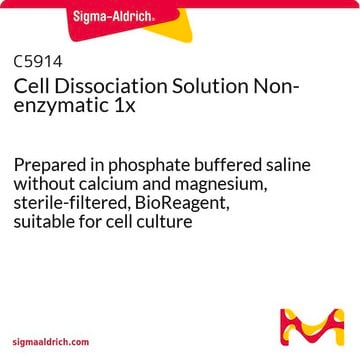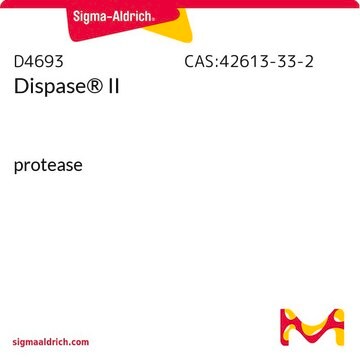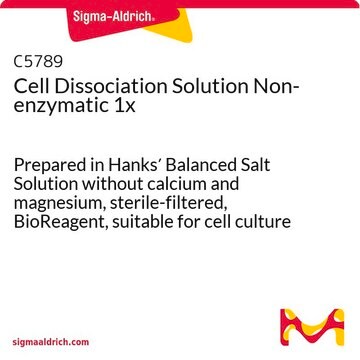A7089
Accumax™ solution
sterile-filtered, suitable for cell culture
Sinónimos:
Cell detachment solution
About This Item
Productos recomendados
sterility
sterile-filtered
Quality Level
form
solution
concentration
1 ×
technique(s)
cell culture | mammalian: suitable
single cell analysis: suitable
pH
6.8-7.8
shipped in
dry ice
storage temp.
−20°C
Application
- for detaching single walled carbon nanotubes from the extracellular matrix (ECM) in epithelial cells
- for dissociation of retinal pigmented epithelial cells prior to passaging
- for dissociation of islets from pancreas
Biochem/physiol Actions
Features and Benefits
Caution
Formula variant
Preparation Note
Legal Information
related product
Storage Class
10 - Combustible liquids
wgk_germany
WGK 2
flash_point_f
Not applicable
flash_point_c
Not applicable
Certificados de análisis (COA)
Busque Certificados de análisis (COA) introduciendo el número de lote del producto. Los números de lote se encuentran en la etiqueta del producto después de las palabras «Lot» o «Batch»
¿Ya tiene este producto?
Encuentre la documentación para los productos que ha comprado recientemente en la Biblioteca de documentos.
Los clientes también vieron
Artículos
Lung organoids are valuable 3D models for human lung development and respiratory diseases. The 3dGRO™ differentiation protocol generates organoids from human iPSCs in 4 steps.
Lung organoids are valuable 3D models for human lung development and respiratory diseases. The 3dGRO™ differentiation protocol generates organoids from human iPSCs in 4 steps.
Lung organoids are valuable 3D models for human lung development and respiratory diseases. The 3dGRO™ differentiation protocol generates organoids from human iPSCs in 4 steps.
Lung organoids are valuable 3D models for human lung development and respiratory diseases. The 3dGRO™ differentiation protocol generates organoids from human iPSCs in 4 steps.
Nuestro equipo de científicos tiene experiencia en todas las áreas de investigación: Ciencias de la vida, Ciencia de los materiales, Síntesis química, Cromatografía, Analítica y muchas otras.
Póngase en contacto con el Servicio técnico














